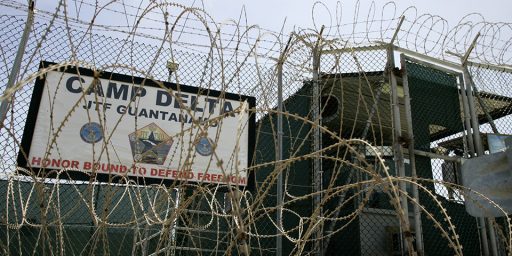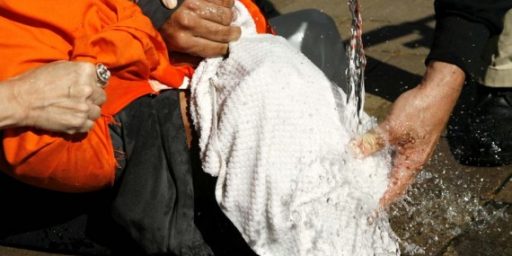Unreported Stories
John Leo has an interesting column at U.S. News on Stories Not Told, where he observes, “As distrust of the press grows, news articles are relentlessly scrutinized for bias, but almost no one is focusing on stories that are simply ignored.”
He gives several examples but the last is the most important:
Rule 18. A different omission marred the reporting of Amnesty International’s report charging torture in U.S. detainment camps. The group didn’t just call Guantanamo a “gulag,” an over-the-top remark that was universally reported. In a press release that most reporters ignored, the group also invited foreign governments to snatch certain visiting American officials off the streets and bring them to trial for crimes against humanity. The suggested snatchees, should they travel abroad, were President Bush, Defense Secretary Donald Rumsfeld, Attorney General Alberto Gonzales, former CIA Director George Tenet, and other unnamed civilian and military officials. Amnesty International said that “all states have a responsibility to investigate and prosecute people responsible for these crimes,” just as the British pounced on Augusto Pinochet in London in 1998. The snatching recommendation wasn’t new, but the Amnesty press release is a useful reminder of the dangers of signing on to the International Criminal Court.
Mainstream media have been reluctant, in all the coverage of treatment of detainees at Guantanamo, to mention that the al Qaeda training manual specifically instructs all of its agents to make false claims of torture. The New York Times seems to have mentioned the manual’s torture reference only once, in a short report from Australia. Several other papers mentioned it as a one-line quote from a military spokesman who pointed it out. But until the Washington Times ran a front-page piece last week, a Nexis search could find no clear and pointed article in the U.S. press like the one by Alasdair Palmer in the London Sunday Telegraph, with the headline “This is al Qaeda Rule 18: ‘You must claim you were tortured.’ ” He wrote that the manual doesn’t prove “that the Britons were not tortured in Guantanamo. But it ought to encourage some doubts about uncritically accepting that they were–which seems to be the attitude adopted by most of the media.” Amen to both points in that last sentence.
Indeed. Obviously, the story has been reported somewhere, as I’ve mentioned it here and it has been widely noted on the blogosphere. What’s interesting, though, is that it is not a normal caveat applied to every story on the torture and abuse claims in the same sense that the Abu Ghraib incidents are.






The ironies are thick here. Frex, I’d like to hear a principled case why the good post-Westphalians who argue that the US has a right to enforce human rights violations anywhere on the globe – e.g. overthrowing governments; snatching terror and war crimes suspects and packing them off to Diego Garcia or the Hague (Milosevic et al) – think that other countries somehow DON’T have the right to enforce human rights violations committed by the US. Warbloggers laugh, for instance, at Belgian pretensions to apply their human rights standards globally, but why is it less just for Belgium to do this than the US?
It is certainly the case that ex-detainees have an incentive to lie – at least as much incentive as, oh, Iraqi and now Iranian defectors do. It was standard intelligence bureaucracy procedure, in fact, to treat defector reports with the utmost skepticism in the days before the Office of Special Plans.
So some defectors will lie, yes. But some of the details of detainee allegations have been confirmed both in official Pentagon reports and from less official venues like the FBI e-mails and on and off-the-record statements by US personnel with firsthand knowledge. The secondary US sources incline any reasonable person to the possibility that official US sources will lie too.
Also, is this famous Al Qaeda training manual on the web anywhere in translation? Reports of its contents – this particular, exculpatory part anyway – have sprouted through the apologiasphere in a matter of days. It would be interesting to read the original.
“Also, is this famous Al Qaeda training manual on the web anywhere in translation? ”
I know I saw a link to the manual at La Shawn Barber’s blog about the time the Newsweek story came out. The link was to the DOJ’s website where the whole manual was posted. The manual was captured I think in a raid somewhere in Europe (UK or Spain maybe?).
Jim, your comment is full of misrepresentations of US policy and actions. But the bottom line is that Guantanamo Bay isn’t a human rights violation.